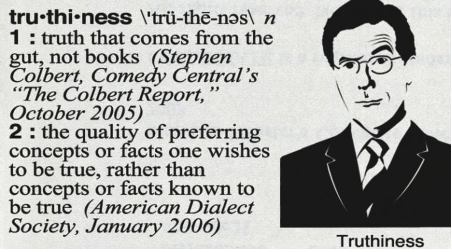American TV host (and lover of Aotearoa-New Zealand) Stephen Colbert coined the word “truthiness” in 2015 to describe the belief that a particular statement is true, despite what logic or evidence or intellect might say, because it intuitively feels right. We’ve seen plenty of examples of truthiness in the recent round of Kiwi and US elections. In truth, Colbert actually took – probably unwittingly – an existing but rarely used word that was already in use with an opposite meaning. The word originally meant “truthfulness” or “faithfulness” but had been around for a few years with the opposite meaning. Colbert’s version and use of the word has put it in our contemporary lexicon. I like it. It has a nice feel to it.

We’re in the midst of overlapping pandemics – the first an actual virus, the second a metaphorical but no less-real virus-like spread of anxiety, stress and uncertainty. It worries me that so few churches seem to be acting out of truth this time. In particular when it comes to worship events. Services.
In John’s Gospel, Jesus says, “You will know the truth, and the truth will set you free”. (John 8)
People in our worshipping communities and our neighbourhoods (including me) are desperate to be free from the anxiety and uncertainty that grips us around the ankles and makes it so difficult to live well, to act well, to love well, and to flourish as beings created in the image of God. Life has become like dragging my feet through the mudflats on Pt Chevalier Beach – it’s hard and tiring work and I’m never quite sure what I’m going to stand on that will hurt.
And the tide-of-life is still going out. The mud is getting deeper. And with it the depth of truthiness rises in our churches.
It seems to me that when we preach as if life is going to return to normal (whatever that means), when our services take no cognisance of the trauma people are experiencing, when our worship ignores the realities of life for the congregation, and our songs drive us toward a future hope rather than sustain us in a present reality, then we are indulging in truthiness.
The result will be a “free-ishness”.
Jesus isn’t to be found in either. He’s still hiding down the back of the couch.
If we are going to find a truth that sets us free from this second pandemic, (and there must be one or my Faith is worthless) then it isn’t going to only be something that makes us feel good, it will have substance that can be explored with head as well as heart.
I’m looking for that truth. The truth that is the vaccine against the second pandemic. I think I glimpse it in the community of relationships that is our church; I see flashes of it in the stories of the wisdom of the Church fathers & mothers, and the saints and mystics; I experience it in silence and meditation and breathing exercises; I’m reminded of it’s reality when I read the Story of God and the stories of Jesus; and I find it when I gather with others to talk , reflect, read, pray and worship in ways that engage my heart, mind, body and soul. And hope rises and the grip lessens.
I think I used the wrong word previously. The Gospel never promises to set me free from the pains of life, it offers me a relationship that will sustain me through them. So I’m looking for a truth (liveable, which is more than words and platitudes) that will sustain me and my community through these times.
I don’t yet have much in the way of answers for what church life might look like that is built on truth that will set us free from what’s gripping our ankles and threatening to pull us all down, but I’m confident it doesn’t look like what we were doing this time last year.
As Dusty Springfield sang in 1964,
“Just wishing and hoping and thinking and praying
And planning and dreaming, his kisses will start
That won’t get you into his heart…”
Her solution to the problem of “catching a man” is behaviour almost inconceivable today, but she was right in thinking that some practical realities needed to change rather than “wishing and hoping”.
Our worshipping communities deserve and desperately need, much more than many are getting from their sung worship leaders and pastors. We need to know that our leaders are on this journey too, and to be encouraged in the practices that will deepen our relationship with the One who said, “I am the way, the truth, and the life.”
Advent is here. We’re waiting, and hoping, and loving, and praying, while peace and joy elude us. But the Prince of Peace will soon be among us, offering a reason for great joy. It’s Advent but Christmas is coming. And we will know the truth, the One who is the Truth – and a relationship with Truth will set us free. And I’ll be trying to figure out what that means to the family of the 14 year old girl who just committed suicide, the guy whose income dried up with his job, and the woman who is terrified of catching Covid-19 on the public transport she has to use every day to get to work.